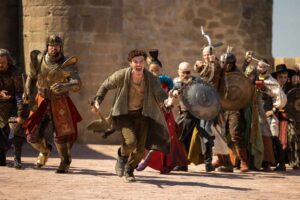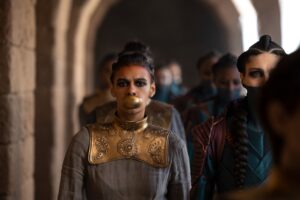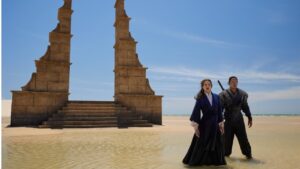MAJOR SPOILERS FOR THE WHEEL OF TIME SEASON TWO AND BOOKS 1 – 4, AHEAD!
I’m not gonna lie, I was worried that the second season of Amazon’s The Wheel Of Time wouldn’t be able to stick the landing. The consistently larger scale action sequences and higher quality visual effects somewhat assuaged my fears that we’d see a repeat of season one’s disappointing final skirmish between an entirely CGI army of Shadowspawn and a handful of Shienarans, but ultimately, none of that would matter if the characters weren’t handled well and season arcs didn’t reach satisfying (albeit only temporary) conclusions. And season one kinda failed on that front, too, stranding certain subplots in the weirdest places. Factor in the penultimate episode’s mischaracterization of Siuan Sanche, and going into the finale, I was justifiably stressed.

And for the first fifteen to twenty minutes, I remained stressed. Characters move around at a rather hectic pace as they all become belatedly aware that it’s the finale and somehow they’re not in place yet even after eight episodes. Things just start happening abruptly because there’s no time left to properly establish why, for instance, the Whitecloaks are attacking Falme today, and many crucial scenes, like the theft of the Horn of Valere, were obviously cut for time, or flow, or because scenes in earlier episodes had already been cut. But once everyone is settled down, the episode begins anew. By remaining laser-focused on specific characters throughout the rousing action, the writers (mostly) succeed at crafting an epic, high-stakes, and engaging finale that should keep viewers invested until the third season (which has nearly finished filming).
There’s a lot of moving parts in this episode, so I’m gonna go character-by-character, in no particular order, to break it all down.
Egwene al’Vere (Madeleine Madden) has never been more popular. She single-handedly holds back Ishamael (Fares Fares), the strongest of the Forsaken, and it’s of course awe-inspiring, a scene destined to make its way into every end-of-the-year tribute to women in movies and television, but it’s not even Egwene’s best moment in this episode. Placing a collar around Renna (Xelia Mendes-Jones)’s neck, putting her through the same torture that Egwene suffered at her hands and letting it kill her, that’s the moment where I think Egwene comes into her own fully. The woman who stands and silently watches as her cruel sul’dam dies gasping out her name is not and never will be the same woman she was before. She is more dangerous now, more cunning, and still as capable as ever, despite all the attempts by the Seanchan to break her indomitable spirit. Those who underestimate her do so at their own risk. It’s kinda surreal to see the fandom finally come around on Egwene, when it used to be that you couldn’t admit to Egwene being your favorite character in the books without eliciting some shocked or horrified responses (why yes, I’m speaking from personal experience), but hey, at least we can all agree now that Egwene is the best.
If there’s one downside to Egwene becoming completely self-reliant this early in the story, it’s that it throws Nynaeve al’Meara (Zoë Robins)’s arc off-balance. Nynaeve is terribly underused in this episode, and I’m tired of having to explain this, but it’s not that I wanted her to magically break through her Block and overcome all her trauma because it’s the finale. What I and other fans of Nynaeve actually wanted was for her to not be benched just because she can’t channel the One Power. Nynaeve has never been a character who relied on the Power. That’s not even how she’s been depicted in the show, where she uses her wits and brute force to solve problems more frequently than weaves of earth, water, fire, air, and spirit. In The Great Hunt, she has a key role in rescuing Egwene from the Seanchan by capturing the sul’dam Seta (Jade Eleena-Dregorius), collaring her, and marching into the kennels with Seta disguised as her damane – and that’s exactly where Nynaeve’s subplot in the finale appears to be going until about halfway through, when Seta abruptly dies before they ever make it to Egwene, Elayne Trakand (Ceara Coveney) gets injured, and for maybe fifteen minutes Nynaeve stares blankly at her arrow-wound – until it falls to Elayne to remind her that she used to be the Wisdom of the Two Rivers, and that she can probably treat this injury in her sleep.
Apparently nobody on the production team studied how to treat an arrow-wound, however, because Nynaeve simply pushes the bolt through Elayne’s leg, fletching and all, and within moments Elayne is miraculously able to stand and climb to the top of a tower just in time for the climactic showdown with Ishamael, with enough energy left over to heal Rand al’Thor (Josha Stradowski) from a life-threatening injury of his own. I’m sorry to have to say it, but it’s bad. It’s as if halfway through filming, the decision was made to have Egwene rescue herself and Nynaeve’s role in the finale had to subsequently be reduced to this. It’s arguably worse than when Perrin Aybara (Marcus Rutherford) ran around doing nothing in the first season finale.
Perrin, at least, has a much meatier role in this episode. He really only does one important thing – killing Geofram Bornhald (Stuart Graham) in revenge for Bornhald’s merciless slaughter of Perrin’s wolf-companion Hopper (Ka Lupinka, an incredible actor who really sells the animal’s last moments) – but it marks a turning-point in his journey towards reconciling the vastly different identities of the wolf and the man tangled up within him to form what is known as a “Wolfbrother”. And he now has Geofram’s vengeful son Dain Bornhald (Jay Duffy) to worry about heading into season three. A shame, that whole situation. Those two were were cute together, fighting back-to-back in the streets of Falme with a dexterity and speed that would give anyone the impression they had known each other for more than a few hours, at most. My only disappointment is that Perrin didn’t get a meaningful scene with Ingtar (Gregg Chillingirian) before the latter’s sudden death, which might have had a chance of resonating with viewers if a scene confirming that he was a Darkfriend seeking redemption (as in the books) had not been cut from the episode.

Ingtar at least steals the Horn of Valere back from the Seanchan, so he’s not a total waste of precious screentime in an episode that needed to be a half-hour longer, but of course it’s Mat Cauthon (Dónal Finn) who eventually blows the Horn – which has a very silly design and is distractingly reminiscent of a plastic bottle of laundry detergent – summoning an equally silly troupe of Renaissance Faire-goers to fight for the Light. To be fair, some of them look pretty cool: Amaresu (Hélène Tran), mentioned in the books to be the female counterpart of the Dragon Reborn in other Turnings of the Wheel, is absolutely stunning, and I want to see more of her (I hope that her taking the Horn from Mat is an an indication that we will). But it’s hard to believe this was “probably the most expensive shot in season two”, when most of the other Heroes, including fan-favorite Birgitte Silverbow, are portrayed by uncredited extras on whom the camera lingers for only a few seconds.
To the delight of many, however, one-eyed warrior Uno Nomesta (Guy Roberts) returns as a Hero of the Horn, allowing the character – who did not die in the books – to show up again in the future. But the biggest surprise is that Mat, too, is a Hero. It’s a change, and it will have consequences, but it might not be such a bad idea. His arc has been building to this moment of much-needed catharsis, where he realizes that he is not, in fact, bound to the Dark One in every lifetime, and if having your soul cosmically linked to a musical instrument for eternity sounds only marginally better to me, it’s still huge for Mat’s character development. Since childhood, he’s been told that he’s not a good person or capable of becoming one, and everyone from his parents to total strangers have made him believe it. But there’s a goodness in Mat Cauthon that nothing and no one can suppress.
Still, though, that pesky cursed dagger he stole from Shadar Logoth tempts him, and even Mat’s solution of tying it to the end of a quarterstaff so he doesn’t come in contact with it ultimately backfires, as he tries to impale Ishamael with his makeshift weapon and accidentally stabs Rand in the stomach, fulfilling Min Farshaw’s viewing of him “killing” Rand with the dagger, albeit not quite how she envisioned. Luckily, the dagger which has corroded most of its other victims from the inside out in a matter of seconds takes its sweet time with Rand, or Elayne might not have been able to save him. In all seriousness, it’s not that big a deal, but it is a little convenient.
Rand, controversially, spends much of the episode lying glassy-eyed in a pile of rubble while his friends hold off Ishamael, shielded by Seanchan damane and suffering from the injury in his side. Between killing the High Lord Turak (Daniel Francis) and his elite bodyguards with a volley of highly precise armor-penetrating fireballs and somewhat meekly pushing his burning sword through Ishamael’s chest, he doesn’t do anything particularly flashy with the One Power, certainly nothing on the level of Moiraine Damodred (Rosamund Pike) blowing the Seanchan fleet to smithereens from miles away, and his big moment – telling Ishamael to his face that he will never serve the Dark One, because “in a thousand lives, I never have” – falls flat without the full weight of the Flicker, Flicker, Flicker sequence from The Great Hunt underscoring his words. The Wheel Of Time keeps putting off Rand’s truly epic and iconic scenes for another season, and it’s a worrisome trend.
With that said, Rand being less powerful than in the early books makes sense for where he is in the show – he’s only reached out to the True Source a few times, after all, mostly without thinking, and he hasn’t had any training outside of a single short conversation with Logain, who was cut off from the Source and therefore of very little help to Rand. But it’s worth noting that Nynaeve has had almost the exact same experience, and when she wields the One Power, the extent of her strength seems almost infinite. When Rand channels, I always get the sense that he’s holding back, using threads of the Power when he could be pulling on the very tapestry that makes up reality itself. At least he has plenty of room to grow from here, but it has to happen soon. The Forsaken are coming, and I’d rather we see actual, evenly-matched battles between them and Rand as opposed to…whatever the heck happened with Ishamael.
Ironically, Ishamael’s defeat isn’t all that different from how it plays out twice in the first three books, but if it was underwhelming then, it’s doubly so in a visual medium. Especially because the show is trying to do better by the Forsaken, and was on the right track giving them nuance, complexity, and depth to their motivations. It was refreshing to see a soft-spoken yet devastatingly competent version of Ishamael, completely unlike his snarling cartoonish counterpart from the books but far more engaging. To be fair, it’s heavily implied in the show that he went into the confrontation with Rand assuming he would die and even looking forward to it, which is very in-character for him, but he exerts too little of his power to make the charade seem believable. We’re talking about a character who could easily be teleporting behind Egwene’s barrier to catch her off-guard, and he’s standing still the whole time, firing off insignificant bullets.
I have faith, still, that this was a poorly executed but deliberate choice, and that Rand will not be able to blow through the remaining Forsaken like so much paper. Ishamael was the only one who so eagerly anticipated the Wheel of Time’s annihilation and his own along with it that he would sacrifice himself on Rand’s sword without hesitation if it could potentially result in the Dark One’s final victory over the Light and the unmaking of the Pattern. The others, with the possible exception of Lanfear (Natasha O’Keeffe), may fear the Dark One and at times revere him, but none would not happily betray him if they felt safe doing so. They each have an agenda. Take Lanfear, for instance. I don’t think she’s seriously considered breaking the Wheel for one moment; her goal is and has always been to win back the heart of Lews Therin Telamon (Karim Alexander), whose soul now resides in Rand’s humbler body, and to rule the world alongside him, never letting him leave her again. She won’t let the Dark One have him.
I’m curious to know what drove Laia Costa’s Moghedien to the Shadow in the first place, and what she wants now. From the little time we spend with her at the very end of the episode, I’m honestly not sure if she has a single coherent thought in her head, but the books do tell us that during the Age of Legends, she was named Lillen Moiral, and worked as an investment advisor, violating every rule of ethics in her pursuit of material power. As a relatively weak channeler, she had to master the art of fading into the background, letting her opponents walk all over her until she had gotten them to lower their guard, and then striking with deadly precision, disappearing before the body hit the floor. She uses this exact tactic on Lanfear, playing at being helpless and child-like until she suddenly has the stronger Forsaken tangled in her webs. She can’t kill Lanfear, but she leaves her with a warning to stay away from Rand: “He’s ours now. All five of them are.”
With Ishamael dead and the series caught up to the ending of The Dragon Reborn, the characters are poised to begin their Shadow Rising arcs; Rand, Egwene and Mat heading to the Aiel Waste for the kind of training they can’t receive elsewhere, Perrin returning to the Two Rivers to deal with the unresolved issue of Padan Fain (Johann Myers), and Nynaeve and Elayne hunting the Black Ajah in Tanchico, while at the White Tower Siuan will face the greatest challenge to her authority as Amyrlin Seat. The Shadow Rising is widely regarded to be one of, if not the, best book in The Wheel Of Time, so expectations are understandably high – and the third season needs to be a hit, because season four was not greenlit far in advance and the second season’s viewing numbers, while relatively strong, were obviously impacted by the WGA and SAG-AFTRA strikes preventing writers and actors from doing promotion on their social media or attending premieres and events, not to mention Amazon’s already sparse marketing (a single trailer, that’s all we got) and the gap of almost two years between seasons.

But The Wheel Of Time deserves to keep turning for a long time yet. The second season, even this imperfect but wildly enjoyable finale, earns the series its place alongside many of its higher-profile competitors in the fantasy genre (dare I say above most, including the more expensive but not as instantly engaging Rings Of Power). The vast world that Robert Jordan created and The Wheel Of Time‘s production designers, set designers, propmakers, costumers, hairstylists, and makeup-artists made into a richly detailed reality is one in which fans can immerse themselves for years and still discover something new. The magic system, vividly realized by the VFX artists and fight coordinators, is among the most intricate that exist, and its depths were unplumbed even by their originator. Most importantly, the characters ripped off the page and brought to life by the series’ incredible cast of actors, from established stars Rosamund Pike and Daniel Henney to relative newcomers Madeleine Madden and Zoë Robins, can support at least as many stories as any of the minor historical figures mentioned in The Lord Of The Rings and A Song Of Ice And Fire who now lead movies and series’. The Wheel Of Time has reached the big leagues. In fact, it got there before the season midpoint. But whether the average viewer knows it will entirely depend on word-of-mouth as long as Amazon’s promotion continues to be nonexistent. And not to be too pushy, but I kinda need that fourth season (and a fifth, and a sixth, and so on), so, uh, go watch it maybe?
Episode Rating: 8.5/10